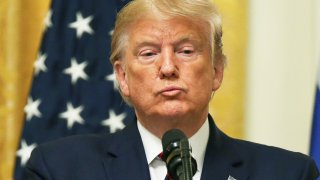
- The Supreme Court rejected a request by former President Donald Trump to block White House records from being sent to a House select committee investigating the January 6 Capitol riot.
- The ruling, which Trump cannot appeal, sets the stage for more than 700 pages of Trump White House records to soon be sent by the National Archives to the committee.
- Trump had argued that he had the authority as a former president to invoke executive privilege to prevent disclosure of the records.
- President Biden had declined to invoke executive privilege for the records, which the committee wants as part of its probe of the invasion of the Capitol by a mob of Trump supporters.
The Supreme Court on Wednesday rejected a request by former President Donald Trump to block White House records from being sent to a House select committee investigating the January 6 Capitol riot.
The ruling, which Trump cannot appeal, sets the stage for more than 700 pages of Trump White House records to soon be sent by the National Archives to the committee, which had issued a subpoena for them.
It also represents a sharp loss for the Republican former president, given that he appointed three of the Supreme Court's six conservative justices, with none of those three indicating support for his effort. The author of Wednesday's ruling was not disclosed.
Of the nine justices, only Clarence Thomas would have granted Trump's application for an injunction blocking the release of the records to the select committee, at least temporarily until the court could hear arguments in the case. Thomas was appointed by President George H.W. Bush, another Republican.
"The Supreme Court's action tonight is a victory for the rule of law and American democracy," said the top Democrat and Republican on the House committee.
Money Report
"The Select Committee has already begun to receive records that the former President had hoped to keep hidden and we look forward to additional productions regarding this important information," Chairman Rep. Bennie Thompson, D-Miss., and Vice Chair Rep. Liz Cheney, R-Wyo., said in a statement issued Wednesday evening.
"Our work goes forward to uncover all the facts about the violence of January 6th and its causes," they said. "We will not be deterred in our effort to get answers for the American people, make legislative recommendations to strengthen our democracy, and help ensure nothing like that day ever happens again."
Get a weekly recap of the latest San Francisco Bay Area housing news. Sign up for NBC Bay Area’s Housing Deconstructed newsletter.
A spokeswoman for Trump did not immediately return a request seeking comment on the ruling.
Trump late last year failed in legal efforts in Washington, D.C.'s federal district and appeals courts to block the panel from getting the documents. He then asked the Supreme Court to take the case.
He had argued unsuccessfully in those courts that he had the authority as a former president to invoke executive privilege to prevent disclosure of the records. He cited that same argument in his application to the Supreme Court.
President Joe Biden had declined to invoke executive privilege for the records, which the committee wants as part of its probe of the events leading up to, during, and after the Jan. 6, 2021, invasion of the Capitol complex by a mob of Trump supporters. For several hours, the riot, which came after weeks of false claims by Trump that there was widespread ballot fraud in the 2020 presidential election, disrupted the confirmation of Biden's victory by a joint session of Congress.
The lower courts had ruled that Trump did not have the power to override Biden's decision to waive executive privilege.
Wednesday's ruling by the Supreme Court did not determine the ultimate questions of whether and when a former president can obtain a court order blocking the release of records, despite an incumbent president saying they can be released.
The ruling noted that those questions are "unprecedented and raise serious and substantial concerns."
But the ruling denying Trump's request to take up the case effectively deferred to a decision last month against him by the D.C. Circuit Court of Appeals, which had concluded that Trump's claims for executive privilege over the documents "would have failed even if he were the incumbent" president, the Supreme Court noted.
The appeals court itself had upheld a lower federal court ruling that said in disputes over privilege between current and past presidents, "the incumbent's view is accorded greater weight."
Because the appeals court ruled that Trump would lose even if he were president, the Supreme Court ruling noted, "his status as a former President thus necessarily made no difference to the [appeals] court's decision."
Because of that, the high court said, any discussion of the appeals court concerning Trump's status as a former president "must therefore be regarded as nonbinding dicta."
In other words, the Supreme Court's ruling in this case will not be considered precedent to be followed when other future courts might be called upon to consider a similar dispute.
Justice Brett Kavanaugh, whom Trump appointed to the court, in a statement released with the ruling said he "respectfully" disagreed with the appeals court's opinion on whether a former president can invoke executive privilege.
"A former President must be able to successfully invoke the Presidential communications privilege for communications that occurred during his Presidency, even if the current President does not support the
privilege claim," Kavanaugh wrote. "Concluding otherwise would eviscerate the executive privilege for Presidential communications."
But that doesn't mean "privilege is absolute or cannot be overcome," Kavanaugh added.






